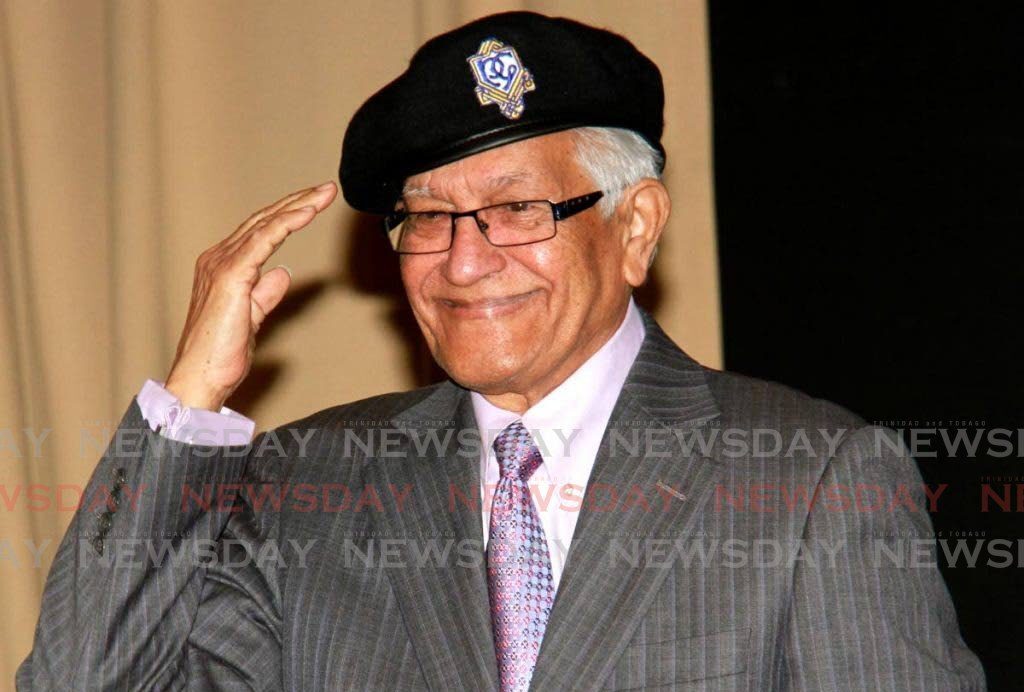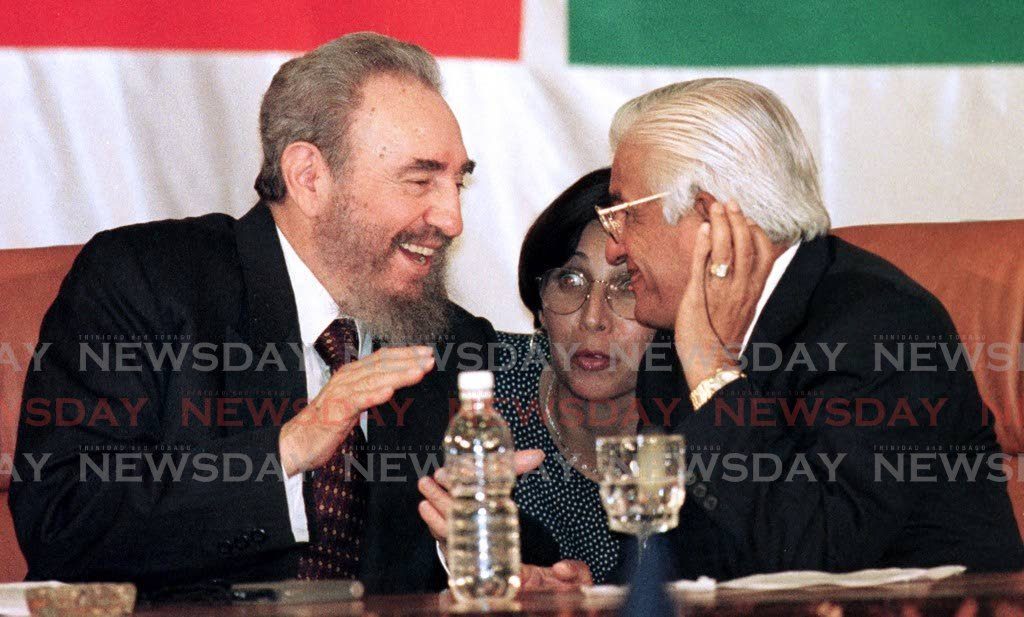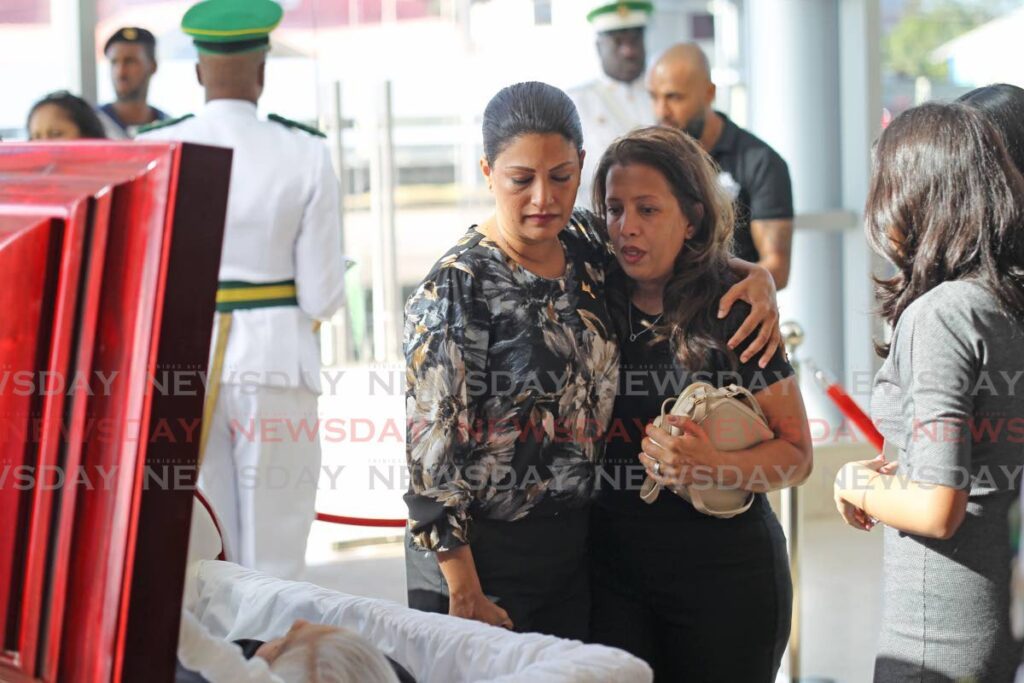Basdeo Panday: The messiah, the missive, the memory

DR INDIRA RAMPERSAD
HAVING BEEN born and bred in the same village, attended the same parochial St Julien Presbyterian Primary School, having also pursued studies in political science and currently serve as president of a trade union, the West Indies Group of University Teachers (WIGUT), I share a deep sense of identification with this iconic institution known as Basdeo Panday.
As the nation, the region and the world mourn his passing, this article seeks not to focus on his departure but to celebrate the life and times of this lion of a legend, this tiger of titanic proportions, whose earthly sojourn far surpassed the limitations of most mortal men. The phenomenal accomplishments of this flamboyant, fearless, fiery freedom fighter has been well-documented by many academics and non-academics alike from within and beyond the Caribbean. Yet he remains an enigma unanswered.
Politician and revolutionary
Panday came into this world in 1933 in the rural village of St Julien, New Grant, Princes Town during the turbulent years of the Great Depression and grew up in urban San Fernando amidst the outbreak of World War II. His flamboyant and eclectic career as prime minister, actor, trade unionist, attorney, economist and politician has impacted the lives of many members of the national, regional and international community.
It was forged during the tumultuous decades of the East-West conflict known as the Cold War when India led in the Non-Aligned Movement in the early sixties, joined by Cuba in the early sixties. Like many Fabian socialists of the decade, Panday’s ideology would have been shaped by Fidel Castro, the Cuban Revolution, Che Guevara and the socialist doctrine which the revolutionaries later adopted. In a 1966 speech, Panday shamelessly announced that “I am happy to be called a communist.” The party structure which he established in the ULF and the UNC consisting of a constituency executive, party groups ad street captains was along the lines of the Soviet political party system
Panday blossomed as a politician and a revolutionary in the post-colonial era during the 70s, 80s and 90s when he assumed the portfolios of opposition leader of the United Labour Front (ULF) in 1976 and as minister of foreign affairs in the National Alliance for Reconstruction (NAR) coalition in 1986, of which the ULF was the majority party. In 1981, as leader of the ULF, he allied with the Democratic Action Congress (DAC) headed by ANR Robinson and the Tapia House Movement led by Lloyd Best.
In 1988, after defecting from the NAR while in power, Panday formed Club 88 and as the Cold War came to an end in 1989, he founded the United National Congress (UNC), the party through which he formed the government. He served as the fifth prime minister of TT from 1995 to 2001 and again as opposition leader from 2001 until 2010.
Blessed with the gift of the gab and an amazing capacity to think on his feet, the street-smart "Silver Fox" simultaneously charmed his supporters and outmanoeuvred his political opponents. Advertently, or inadvertently, he courted controversy as the local and regional media lapped up his mischievous wit, sardonic humour and acerbic but colourful rhetoric.
Flitting like a butterfly and stinging like a bee
In 2007, I presented a paper at a UWI forum entitled “Flitting like a Butterfly and Stinging like a Bee: Cradling the Contradiction of the Panday Phenomenon in the 2007 Elections.” As the graceful butterfly and the stinging bee, Panday was amongst the finest examples of the charismatic populist leader in the region on the one hand, and the consummate Hobbsian/Machiavellian realist politician on the other, of the ilk of Fidel Castro.

During his political campaigns and platform rhetoric, his undeniable vivacious charm seeped through the raw charisma which he emanated as he seamlessly flitted among the masses and the elites, from paupers to princes, with many hoping for a smile, a touch, a hug or just to catch the eye of their hero in the crowd of animated supporters. But he also revelled in pitting his audience and supporters against his opponents in a potent and at times acerbic real or imaginary “we versus them” dichotomy. It was difficult at times to distinguish between the sincere trade unionist, attorney, economist or politician and the consummate actor and dramatist as he effortlessly flitted like a butterfly from one role to the other, confusing his audience as to whether he was serious or joking.
Consummate realist politician
Yet Panday practised a stinging conflictual, Hobbsian, if not Machiavellian style of politics which he often described as “a civilised form of war.” Schooled in political science, he understood well the machinations of the realist paradigm, both in theory and praxis. He was the consummate realist politician. More than most, he recognised that politics is about power, that power is an end in itself and that conflict, which he perceived as the essence of politics, is a means to that end.
It is through these realist theoretical lens that he pragmatically trained his guns against his political adversaries, of which there were many. Some of his closest political allies who fell out with him and became his worst foes were forced to bear the brunt of his wrath in no uncertain terms as he pelted derogatory nicknames at them – from Raffick Shah to Hulsie Bhagan, ANR Robinson and “the three musketeers” – Ramesh, Ralph and Sudama – to Winston Dookeran, Jack Warner, Patrick Manning and, finally, Kamla-Persad Bissessar. But later, when questioned on schmoozing with Manning at an old boys reunion at Presentation College, he retorted in true Panday style that these were not “enemies.” Rather, they were “political opponents” as he deftly distinguished between the professional and the personal.
Down with the parasitic oligarchy
The crafty Silver Fox played well the populist political card in his vitriolic attack against the “parasitic oligarchy.” He pinpointed the unholy alliance between the drug lords, whom he stated were in cahoots with the parasitic oligarchy and the “corrupt PNM government.” His campaign against the capitalists reached fever pitch in the run-up to the 1995 general election as he pitted the rich bourgeoisie elites against the poor proletariat. His working class audience revered him for calling out these monied men. However, Panday did not view the oligarchy necessarily as French Creoles, but also Africans and East Indians who wielded economic power.
Lauded as “the New Messiah” by his thousands of followers, his missive highlighted an ethno-politico/economic reality in identifying those whom he perceived as the perpetrators. “Sometimes, they think they are white, and because of that they hold sway in the country,” he noted, claiming that “the black managerial class only had office, but the parasitic oligarchy had the power.” He summarised that “What I am trying to say is that every five years the black masses win the elections, but the oligarchy wins the government.”
Many of my columns in the national newspapers during Panday’s reign as prime minister between 1995 and 2001 critiqued his uncharacteristic and ironic embrace of members of the very parasitic oligarchy. Some even served in his Cabinet as government ministers and may have partially accounted for his downfall in 2001 as several UNC ministers at the time could not cradle the contradiction. To this he would respond that “politics make strange bedfellows” and that as prime minister it was imperative to co-opt the economic elites to be able to govern peacefully in a plural society.
Constitutional reform and national unity
Panday’s persistent pursuit for constitutional reform post-2010 brought him more than once to my office at UWI, to seek assistance for this mission. He articulated an interesting formula by which this could be achieved by including major sectors of the population in the national Parliament. This idea is well worth further exploration both in theory and praxis.

The enduring legacy of Basdeo Panday includes his incessant call for inclusivity and national unity, his insistent quest for education for all and economic equality to take us out of poverty and his tireless rhetoric of “transcending the racial rubicon.” These were well encapsulated in his clarion call in a speech he made as external affairs minister in 1987 during the rule of the NAR:
If we don’t want the tide of history to pass us by, we must begin the process now. The first step is to dedicate ourselves for the fearless search for truth. The darkness of deceit cannot stand the seering light of truth. We must begin immediately to discuss those touchy national issues, for example – eliminating discrimination of all kind, whether they be based on race, class, colour, or sex; the nature of the power structure in the society, whether they be social, political or economic; the question of the distribution of state resources. Are we going to have equality or do we continue the way we have been going.
Man at the top
At the 1995 launch of his second volume of speeches which I co-edited with Samaroo Siewah, entitled “Basdeo Panday: Man in the Middle,” I stated that “the Man in the Middle would one day become the Man at the Top.” Panday died fighting with his boots on. Even his crushing defeat in the internal elections which removed him as opposition leader in 2010 did not break his undaunted spirit. His memory and legacy would continue to live on, leaving an indelible mark in the hearts, minds and souls of his supporters and detractors, alike.
The Silver Fox may now be looking down at us, chuckling mischievously: “Ha! Ha! I have won both the battle and the war. While you mortals languish in the political wilderness in crime-ridden TT, I am now chilling with the Almighty as the Man at the Top.”
Dr Indira Rampersad is Head of the Department of Political Science and lecturer in Political Science/International Relations at the UWI, St Augustine.


Comments
"Basdeo Panday: The messiah, the missive, the memory"